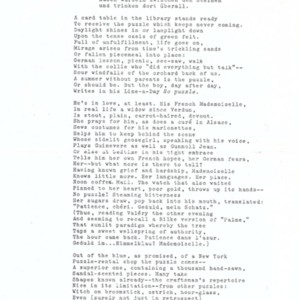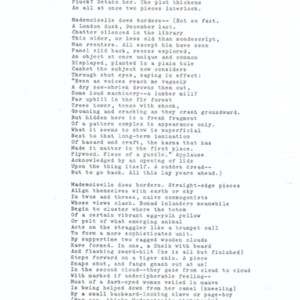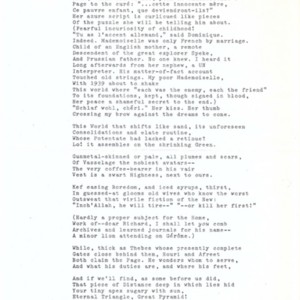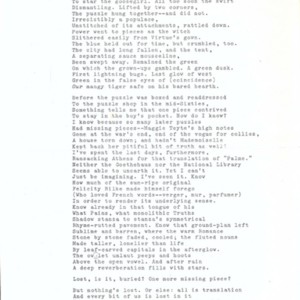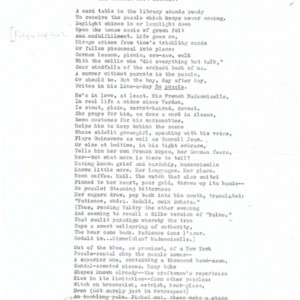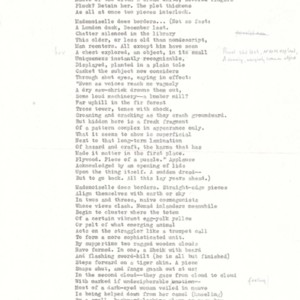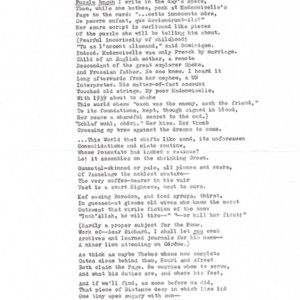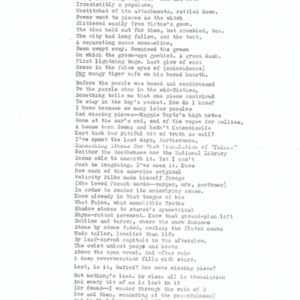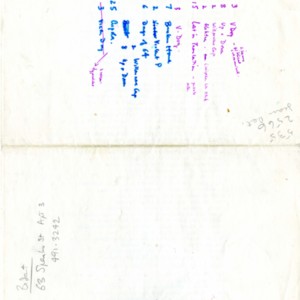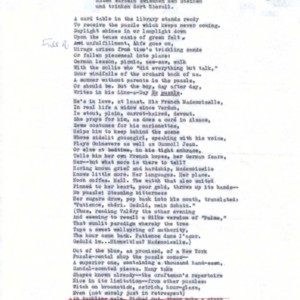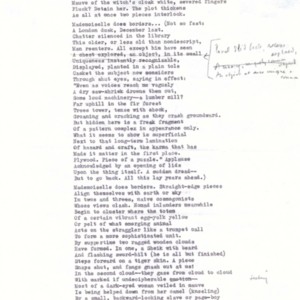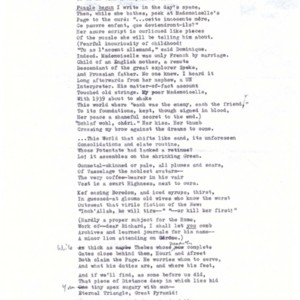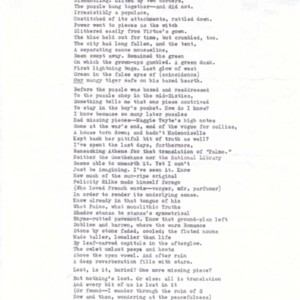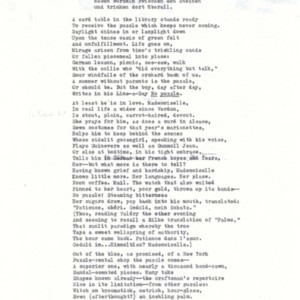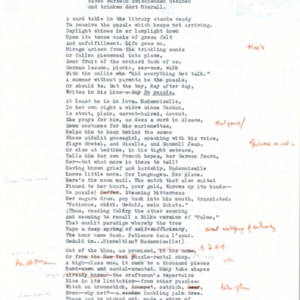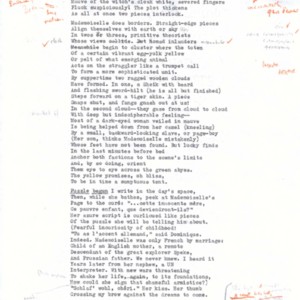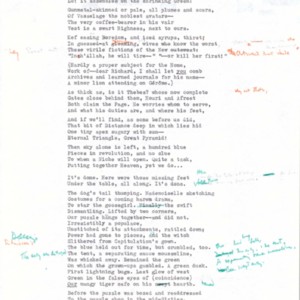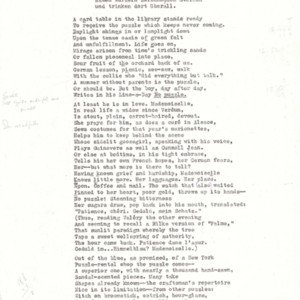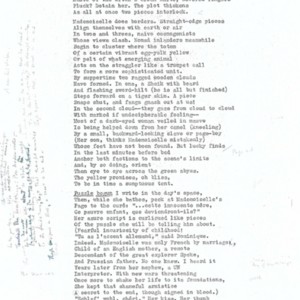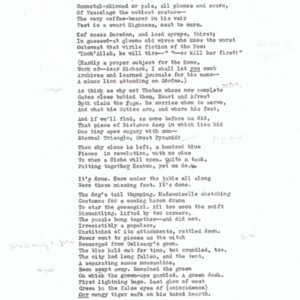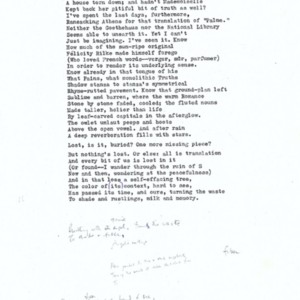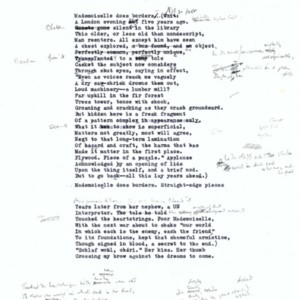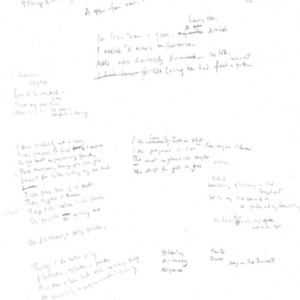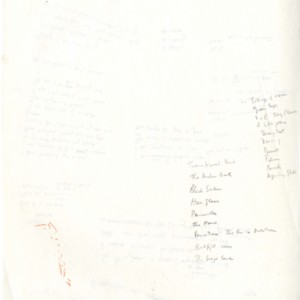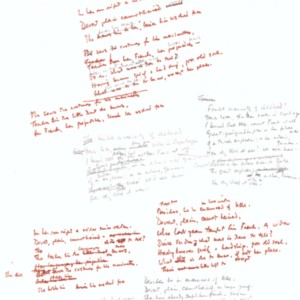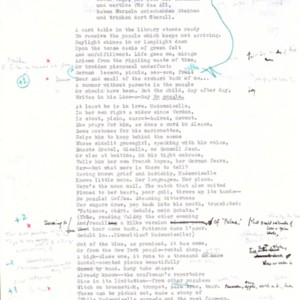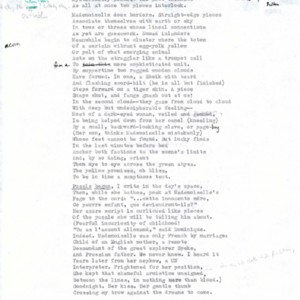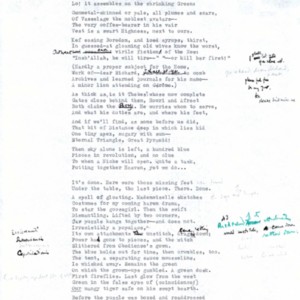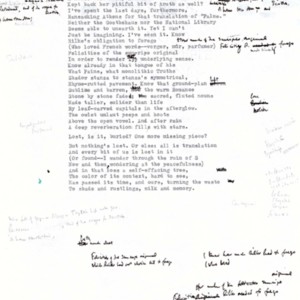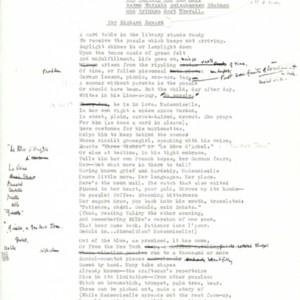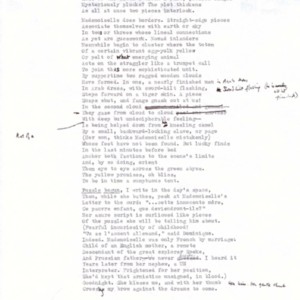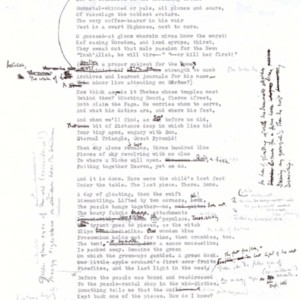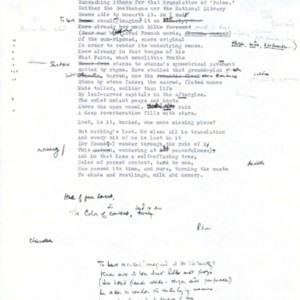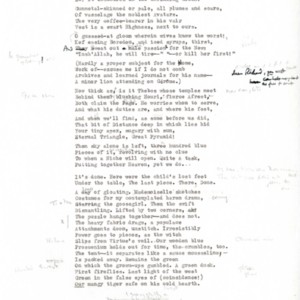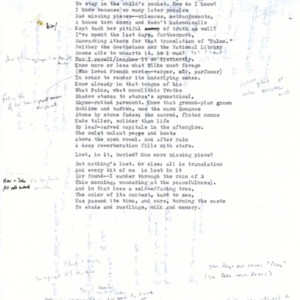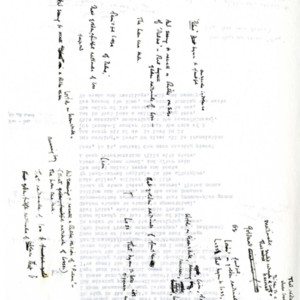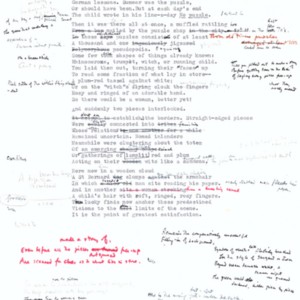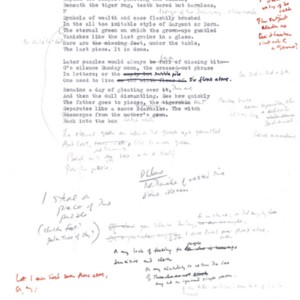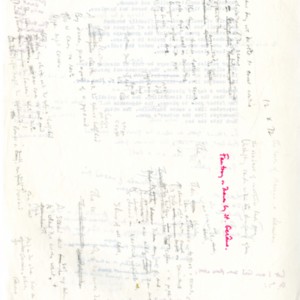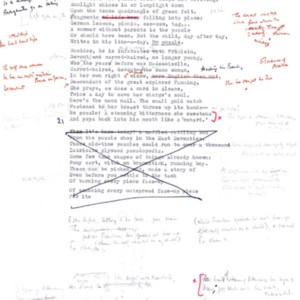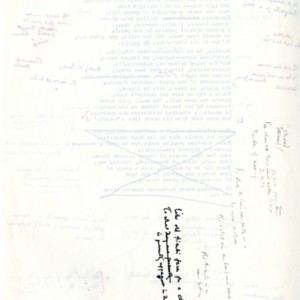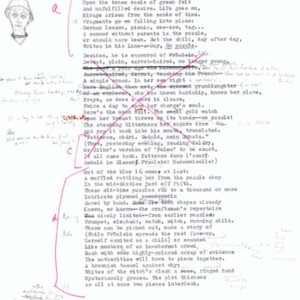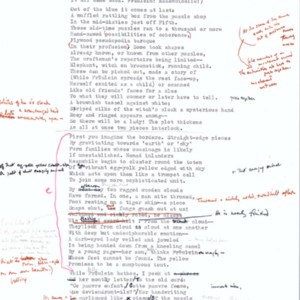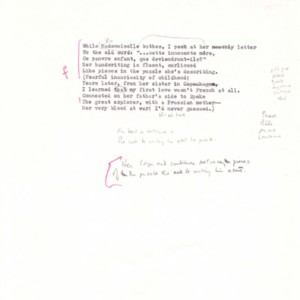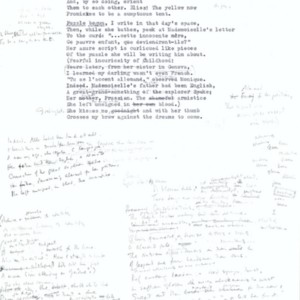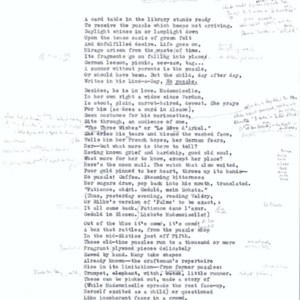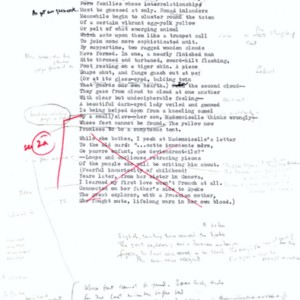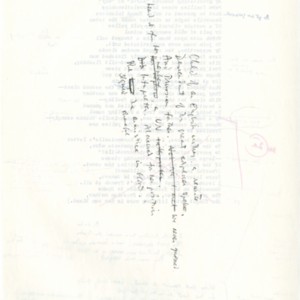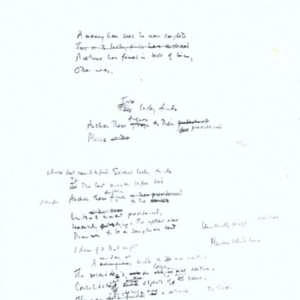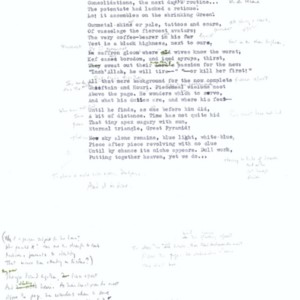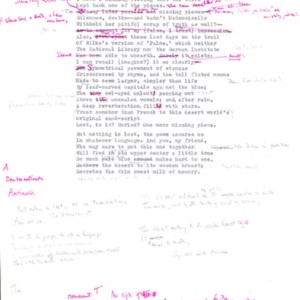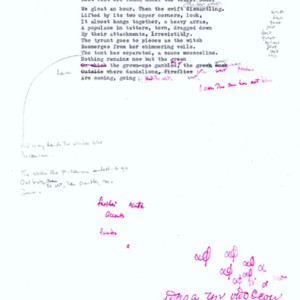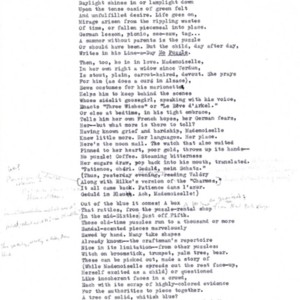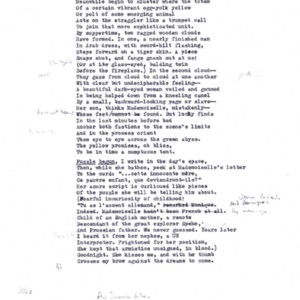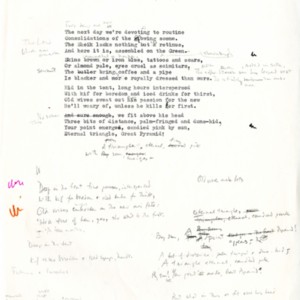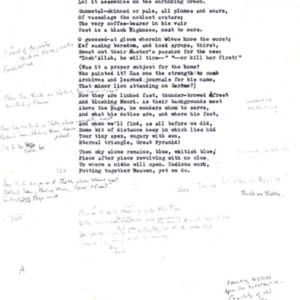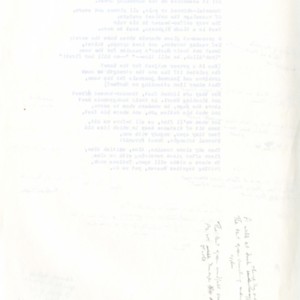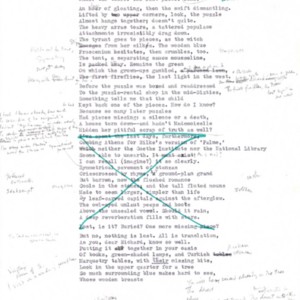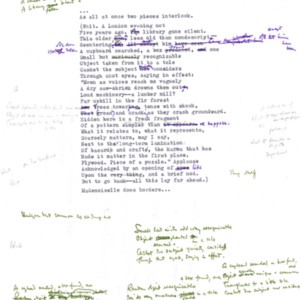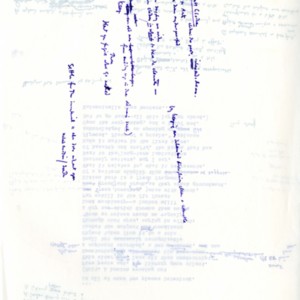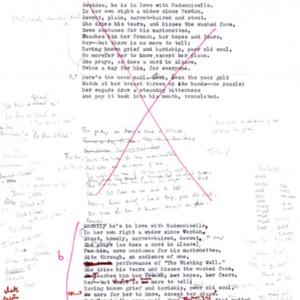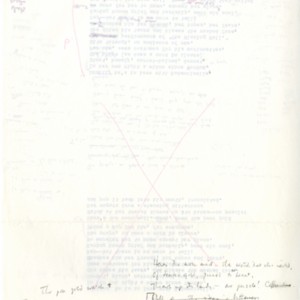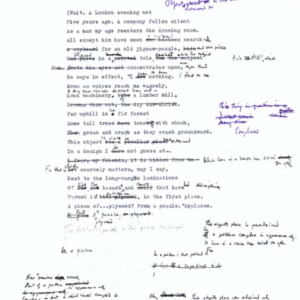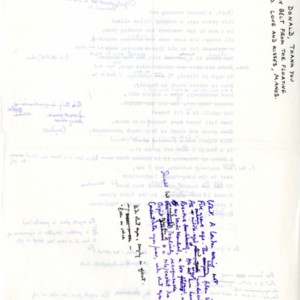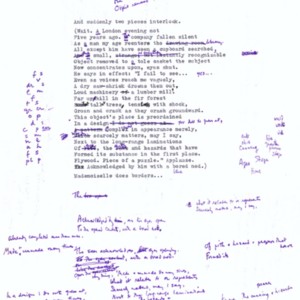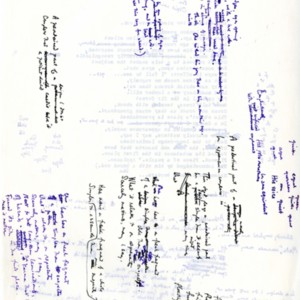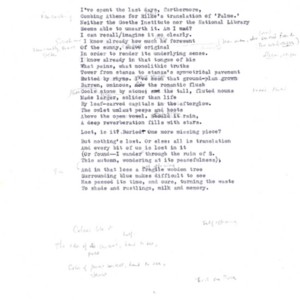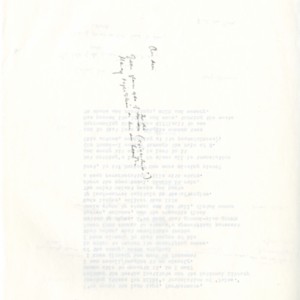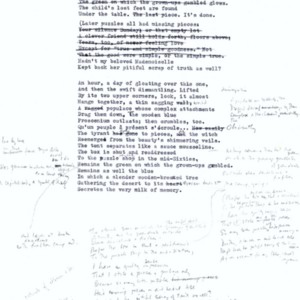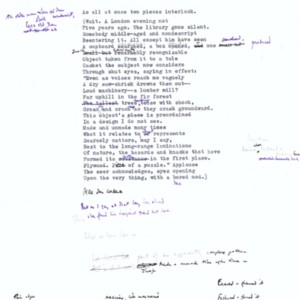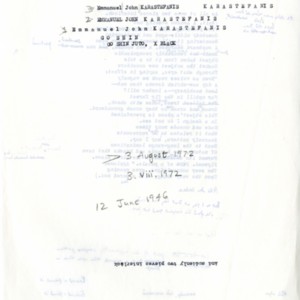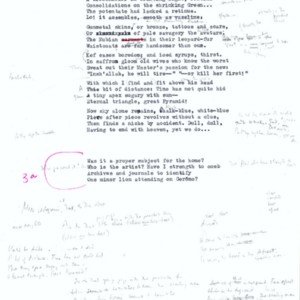"Lost in Translation" Drafts
Dublin Core
Title
"Lost in Translation" Drafts
Subject
Merrill, James, 1926-1995. Divine Comedies.
Subject Authority:
Merrill, James, 1926-1995—The Book of Ephraim
Subject Authority:
Merrill, James, 1926-1995—The Book of Ephraim
Description
Seven complete typescript drafts, all of them titled and with the Rilke epigraph and dedication to Richard Howard. These are in different stages of completion with respect to the final published version, but appear to be from a later date than any of the fragmentary typescripts. The corrections, strikes-through, etc., from Merrill are usually confined to changing a word or two as opposed to full lines or stanzas; the complete drafts in this regard show a remarkable likeness and consistency. One draft appears to be complete and more or less identical to the published version, and as such has no annotations from Merrill. Twenty-six fragmentary typescript drafts, most dated October 1972, with extensive annotations, ranging in completion anywhere from a few verse paragraphs to a couple of pages. Many of the drafts are untitled; where there is a title, it has been penciled in by Merrill. Three handwritten pages, mostly of annotations, outlines and sketches in pencil and felt-tip orange marker. Nothing approaching a complete draft is present, not even of a stanza, but nevertheless of interest for the outlines of the events in the poem in the reverse of one of the three pages.
Creator
Merrill, James
Source
James Merrill Papers (MSS083), Box 133, Folder 3338
Rights
Notification of Intent to Quote from or Publish Manuscript Materialsform. All publication not covered by fair use is restricted to those who have permission of the copyright holder.
Format
text
Resolution: 600ppi
Fifty-nine pages (72 images) of manuscript and typescript drafts and notes toward the poem "Lost in Translation."
Resolution: 600ppi
Fifty-nine pages (72 images) of manuscript and typescript drafts and notes toward the poem "Lost in Translation."
Language
English
Type
Manuscripts
Identifier
2013-12-20T08_50_30_Manuscripts_Mino
spc:2013-12-20T08_50_30_Manuscripts_Mino
Scripto
Transcription
LOST IN TRANSLATION
for Richard Howard
Diese Tage, die leer dir scheinen
und wertlos f¸r das All,
haben Wurzeln zwischen den Steinen
und trinken dort ¸berall.
A card table in the library stands ready
To receive the puzzle which keeps never coming.
Daylight shines in or lamplight down
Upon the tense oasis of green felt.
Full of unfulfillment, life goes on,
Mirage arisen from time's trickling sands
Or fallen piecemeal into place:
German lesson, picnic, see-saw, walk
With the collie who "did everything but talk" --
Sour windfalls of the orchard back of us.
A summer without parents is the puzzle,
Or should be. But the boy, day after day,
Write in his Line-a-Day No puzzle.
He's in love, at least. His French Mademoiselle,
In real life a widow since Verdun,
Is stout, plain, carrot-haired, devout.
She prays for him, as does a curÈ in Alsace,
Sews costumes for his marionettes,
Helps him to keep behind the scene
Whose sidelit goosegirl, speaking with his voice,
Plays Guinevere as well as Gunmoll Jean.
Or else at bedtime in his tight embrace
Tells him her own French hopes, her German fears,
Her -- but what more is there to tell?
Having known grief and hardship, Mademoiselle
Knows little more. Her languages. Her place.
Noon coffee. Mail. The watch that also waited
Pinned to her heart, poor gold, throws up its hands --
No puzzle! Steaming bitterness
Her sugars draw, pop back into his mouth, translated:
"Patience, chÈri. Geduld, mein Schatz."
(Thus, reading ValÈry the other evening
And seeming to recall a Rilke version of "Palme,"
That sunlit paradigm whereby the tree
Taps a sweet wellspring of authority,
The hour came back. Patience dans l'azur.
Geduld im...Himmelblau? Mademoiselle.)
Out of the blue, as promised, of a New York
Puzzle-rental shop the puzzle comes--
A superior one, containing a thousand hand-sawn,
Sandal-scented pieces. Many take
Shapes known already--the craftsman's repertoire
Nice in its limitation--from other puzzles:
Witch on broomstick, ostrich, hour-glass,
Even (surely not just in retrospect)
An inchling, innocently branching palm.
These can be put aside, made stories of
While Mademoiselle spreads out the rest face-up,
Herself excited as a child; or questioned
Like incoherent faces in a crowd,
Each with its scrap of highly-colored
Evidence the Law must piece together.
Sky-blue ostrich? Likely story.
Mauve of the witch's cloak white, severed fingers
Pluck? Detain her. The plot thickens
As all at once two pieces interlock.
Mademoiselle does borders-- (Not so fast.
A London dusk, December last.
Chatter silenced in the library
This older, or less old than nondescript,
Man reenters. All except him have seen
Panel slid back, recess explored,
An object at once unique and common
Displayed, planted in a plain tole
Casket the subject now considers
Through shut eyes, saying in effect:
"Even as voices reach me vaguely
A dry saw-shriek drowns them out,
Some loud machinery--a lumber mill?
Far uphill in the fir forest
Trees tower, tense with shock,
Groaning and cracking as they crash groundward.
But hidden here is a freak fragment
Of a pattern complex in appearance only.
What it seems to show is superficial
Next to that long-term lamination
Of hazard and craft, the karma that has
Made it matter in the first place.
Plywood. Piece of a puzzle." Applause
Acknowledged by an opening of lids
Upon the thing itself. A sudden dread--
But to go back. All this lay years ahead.)
Mademoiselle does borders. Straight-edge pieces
Align themselves with earth or sky
In twos and threes, naive cosmogonists
Whose views clash. Nomad inlanders meanwhile
Begin to cluster where the totem
Of a certain vibrant egg-yolk yellow
Or pelt of what emerging animal
Acts on the straggler like a trumpet call
To form a more sophisticated unit.
By suppertime two ragged wooden clouds
Have formed. In one, a Sheik with beard
And flashing sword-hilt (he is all but finished)
Steps forward on a tiger skin. A piece
Snaps shut, and fangs gnash out at us!
In the second cloud--they gaze from cloud to cloud
With marked if undecipherable feeling--
Most of a dark-eyed woman veiled in mauve
Is being helped down from her camel (kneeling)
By a small backward-looking slave or page-boy
(Her son, thinks Mademoiselle mistakenly)
Whose feet have not been found. But lucky finds
In the last minutes before bed
Anchor both factions to the scene's limits
And, by so doing, orient
Them eye to eye across the green abyss.
The yellow promises, oh bliss,
To be in time a sumptuous tent.
Puzzle begun I write in the day's space,
Then, while she bathes, peek at Mademoiselle's
Page to the curÈ: "...cette innocente mËre,
Ce pauvre enfant, que deviendront-ils?"
Her azure script is curlicued like pieces
Of the puzzle she will be telling him about.
(Fearful incuriosity of childhood!
"Tu as l'accent allemand," said Dominique.
Indeed. Mademoiselle was only French by marriage.
Child of an English mother, a remote
Descendent of the great explorer Speke,
And Prussian father. No one knew. I heard it
Long afterwards from her nephew, a UN
Interpreter. His matter-of-fact account
Touched old strings. My poor Mademoiselle,
With 1939 about to shake
This world where "each was the enemy, each the friend"
To its foundations, kept, though signed in blood,
Her peace a shameful secret to the end.)
"Schlaf wohl, chÈri." Her kiss. Her thumb
Crossing my brow against the dreams to come.
This World that shifts like sand, its unforeseen
Consolidations and elate routine,
Whose Potentate had lacked a retinue?
Lo! it assembles on the shrinking Green.
Gunmetal-skinned or pale, all plumes and scars,
Of Vasselage the noblest avatars--
The very coffee-bearer in his vair
Vest is a swart Highness, next to ours.
Kef easing Boredom, and iced syrups, thirst,
In guessed-at glooms old wives who know the worst
Outsweat that virile fiction of the New:
"Inch'Allah, he will tire--" "--or kill her first!"
(Hardly a proper subject for the Home,
Work of--dear Richard, I shall let you comb
Archives and learned journals for his name--
A minor lion attending on GÈrÙme.)
While, thick as Thebes whose presently complete
Gates close behind them, Houri and Afreet
Both claim the Page. He wonders whom to serve,
And what his duties are, and where his feet,
And if we'll find, as some before us did,
That piece of Distance deep in which lies hid
Your tiny apex sugary with sun,
Eternal Triangle, Great Pyramid!
Then sky alone is left, a hundred blue
Fragments in revolution, with no clue
To where a Niche will open. Quite a task,
Putting together Heaven, yet we do.
It's done. Here under the table all along
Were those missing feet. It's done.
The dog's tail thumping. Mademoiselle sketching
Costumes for a coming harem drama
To star the goosegirl. All too soon the swift
Dismantling. Lifted by two corners,
The puzzle hung together--and did not.
Irresistibly a populace,
Unstitched of its attachments, rattled down.
Power went to pieces as the witch
Slithered easily from Virtue's gown.
The blue held out for time, but crumbled, too.
The city had long fallen, and the tent,
A separating sauce mousseline,
Been swept away. Remained the green
On which the grown-ups gambled. A green dusk.
First lightning bugs. Last glow of west
Green in the false eyes of (coincidence)
Our mangy tiger safe on his bared hearth.
Before the puzzle was boxed and readdressed
To the puzzle shop in the mid-Sixties,
Something tells me that one piece contrived
To stay in the boy's pocket. How do I know?
I know because so many later puzzles
Had missing pieces--Maggie Teyte's high notes
Gone at the war's end, end of the vogue for collies,
A house torn down; and hadn't Mademoiselle
Kept back her pitiful bit of truth as well?
I've spent the last days, furthermore,
Ransacking Athens for that translation of "Palme."
Neither the Goethehause nor the National Library
Seems able to unearth it. Yet I can't
Just be imagining. I've seen it. Know
How much of the sun-ripe original
Felicity Rilke made himself forego
(Who loved French words--verger, mur, parfumer)
In order to render its underlying sense.
Know already in that tongue of his
What Pains, what monolithic Truths
Shadow stanza to stanza's symmetrical
Rhyme-rutted pavement. Know that ground-plan left
Sublime and barren, where the warm Romance
Stone by stone faded, cooled; the fluted nouns
Made taller, lonelier than life
By leaf-carved capitals in the afterglow.
The ow let umlaut peeps and hoots
Above the open vowel. And after rain
A deep reverberation fills with stars.
Lost, is it, buried? One more missing piece?
But nothing's lost. Or else: all is translation
And every bit of us is lost in it
(Or found--I wander through the ruin of S
Now and then, wondering at the peacefulness)
And in that loss a self-effacing tree,
Color of sheer context, hard to see,
Has rustled with its angel, turned the waste
To shade and fiber, milk and memory.
for Richard Howard
Diese Tage, die leer dir scheinen
und wertlos f¸r das All,
haben Wurzeln zwischen den Steinen
und trinken dort ¸berall.
A card table in the library stands ready
To receive the puzzle which keeps never coming.
Daylight shines in or lamplight down
Upon the tense oasis of green felt.
Full of unfulfillment, life goes on,
Mirage arisen from time's trickling sands
Or fallen piecemeal into place:
German lesson, picnic, see-saw, walk
With the collie who "did everything but talk" --
Sour windfalls of the orchard back of us.
A summer without parents is the puzzle,
Or should be. But the boy, day after day,
Write in his Line-a-Day No puzzle.
He's in love, at least. His French Mademoiselle,
In real life a widow since Verdun,
Is stout, plain, carrot-haired, devout.
She prays for him, as does a curÈ in Alsace,
Sews costumes for his marionettes,
Helps him to keep behind the scene
Whose sidelit goosegirl, speaking with his voice,
Plays Guinevere as well as Gunmoll Jean.
Or else at bedtime in his tight embrace
Tells him her own French hopes, her German fears,
Her -- but what more is there to tell?
Having known grief and hardship, Mademoiselle
Knows little more. Her languages. Her place.
Noon coffee. Mail. The watch that also waited
Pinned to her heart, poor gold, throws up its hands --
No puzzle! Steaming bitterness
Her sugars draw, pop back into his mouth, translated:
"Patience, chÈri. Geduld, mein Schatz."
(Thus, reading ValÈry the other evening
And seeming to recall a Rilke version of "Palme,"
That sunlit paradigm whereby the tree
Taps a sweet wellspring of authority,
The hour came back. Patience dans l'azur.
Geduld im...Himmelblau? Mademoiselle.)
Out of the blue, as promised, of a New York
Puzzle-rental shop the puzzle comes--
A superior one, containing a thousand hand-sawn,
Sandal-scented pieces. Many take
Shapes known already--the craftsman's repertoire
Nice in its limitation--from other puzzles:
Witch on broomstick, ostrich, hour-glass,
Even (surely not just in retrospect)
An inchling, innocently branching palm.
These can be put aside, made stories of
While Mademoiselle spreads out the rest face-up,
Herself excited as a child; or questioned
Like incoherent faces in a crowd,
Each with its scrap of highly-colored
Evidence the Law must piece together.
Sky-blue ostrich? Likely story.
Mauve of the witch's cloak white, severed fingers
Pluck? Detain her. The plot thickens
As all at once two pieces interlock.
Mademoiselle does borders-- (Not so fast.
A London dusk, December last.
Chatter silenced in the library
This older, or less old than nondescript,
Man reenters. All except him have seen
Panel slid back, recess explored,
An object at once unique and common
Displayed, planted in a plain tole
Casket the subject now considers
Through shut eyes, saying in effect:
"Even as voices reach me vaguely
A dry saw-shriek drowns them out,
Some loud machinery--a lumber mill?
Far uphill in the fir forest
Trees tower, tense with shock,
Groaning and cracking as they crash groundward.
But hidden here is a freak fragment
Of a pattern complex in appearance only.
What it seems to show is superficial
Next to that long-term lamination
Of hazard and craft, the karma that has
Made it matter in the first place.
Plywood. Piece of a puzzle." Applause
Acknowledged by an opening of lids
Upon the thing itself. A sudden dread--
But to go back. All this lay years ahead.)
Mademoiselle does borders. Straight-edge pieces
Align themselves with earth or sky
In twos and threes, naive cosmogonists
Whose views clash. Nomad inlanders meanwhile
Begin to cluster where the totem
Of a certain vibrant egg-yolk yellow
Or pelt of what emerging animal
Acts on the straggler like a trumpet call
To form a more sophisticated unit.
By suppertime two ragged wooden clouds
Have formed. In one, a Sheik with beard
And flashing sword-hilt (he is all but finished)
Steps forward on a tiger skin. A piece
Snaps shut, and fangs gnash out at us!
In the second cloud--they gaze from cloud to cloud
With marked if undecipherable feeling--
Most of a dark-eyed woman veiled in mauve
Is being helped down from her camel (kneeling)
By a small backward-looking slave or page-boy
(Her son, thinks Mademoiselle mistakenly)
Whose feet have not been found. But lucky finds
In the last minutes before bed
Anchor both factions to the scene's limits
And, by so doing, orient
Them eye to eye across the green abyss.
The yellow promises, oh bliss,
To be in time a sumptuous tent.
Puzzle begun I write in the day's space,
Then, while she bathes, peek at Mademoiselle's
Page to the curÈ: "...cette innocente mËre,
Ce pauvre enfant, que deviendront-ils?"
Her azure script is curlicued like pieces
Of the puzzle she will be telling him about.
(Fearful incuriosity of childhood!
"Tu as l'accent allemand," said Dominique.
Indeed. Mademoiselle was only French by marriage.
Child of an English mother, a remote
Descendent of the great explorer Speke,
And Prussian father. No one knew. I heard it
Long afterwards from her nephew, a UN
Interpreter. His matter-of-fact account
Touched old strings. My poor Mademoiselle,
With 1939 about to shake
This world where "each was the enemy, each the friend"
To its foundations, kept, though signed in blood,
Her peace a shameful secret to the end.)
"Schlaf wohl, chÈri." Her kiss. Her thumb
Crossing my brow against the dreams to come.
This World that shifts like sand, its unforeseen
Consolidations and elate routine,
Whose Potentate had lacked a retinue?
Lo! it assembles on the shrinking Green.
Gunmetal-skinned or pale, all plumes and scars,
Of Vasselage the noblest avatars--
The very coffee-bearer in his vair
Vest is a swart Highness, next to ours.
Kef easing Boredom, and iced syrups, thirst,
In guessed-at glooms old wives who know the worst
Outsweat that virile fiction of the New:
"Inch'Allah, he will tire--" "--or kill her first!"
(Hardly a proper subject for the Home,
Work of--dear Richard, I shall let you comb
Archives and learned journals for his name--
A minor lion attending on GÈrÙme.)
While, thick as Thebes whose presently complete
Gates close behind them, Houri and Afreet
Both claim the Page. He wonders whom to serve,
And what his duties are, and where his feet,
And if we'll find, as some before us did,
That piece of Distance deep in which lies hid
Your tiny apex sugary with sun,
Eternal Triangle, Great Pyramid!
Then sky alone is left, a hundred blue
Fragments in revolution, with no clue
To where a Niche will open. Quite a task,
Putting together Heaven, yet we do.
It's done. Here under the table all along
Were those missing feet. It's done.
The dog's tail thumping. Mademoiselle sketching
Costumes for a coming harem drama
To star the goosegirl. All too soon the swift
Dismantling. Lifted by two corners,
The puzzle hung together--and did not.
Irresistibly a populace,
Unstitched of its attachments, rattled down.
Power went to pieces as the witch
Slithered easily from Virtue's gown.
The blue held out for time, but crumbled, too.
The city had long fallen, and the tent,
A separating sauce mousseline,
Been swept away. Remained the green
On which the grown-ups gambled. A green dusk.
First lightning bugs. Last glow of west
Green in the false eyes of (coincidence)
Our mangy tiger safe on his bared hearth.
Before the puzzle was boxed and readdressed
To the puzzle shop in the mid-Sixties,
Something tells me that one piece contrived
To stay in the boy's pocket. How do I know?
I know because so many later puzzles
Had missing pieces--Maggie Teyte's high notes
Gone at the war's end, end of the vogue for collies,
A house torn down; and hadn't Mademoiselle
Kept back her pitiful bit of truth as well?
I've spent the last days, furthermore,
Ransacking Athens for that translation of "Palme."
Neither the Goethehause nor the National Library
Seems able to unearth it. Yet I can't
Just be imagining. I've seen it. Know
How much of the sun-ripe original
Felicity Rilke made himself forego
(Who loved French words--verger, mur, parfumer)
In order to render its underlying sense.
Know already in that tongue of his
What Pains, what monolithic Truths
Shadow stanza to stanza's symmetrical
Rhyme-rutted pavement. Know that ground-plan left
Sublime and barren, where the warm Romance
Stone by stone faded, cooled; the fluted nouns
Made taller, lonelier than life
By leaf-carved capitals in the afterglow.
The ow let umlaut peeps and hoots
Above the open vowel. And after rain
A deep reverberation fills with stars.
Lost, is it, buried? One more missing piece?
But nothing's lost. Or else: all is translation
And every bit of us is lost in it
(Or found--I wander through the ruin of S
Now and then, wondering at the peacefulness)
And in that loss a self-effacing tree,
Color of sheer context, hard to see,
Has rustled with its angel, turned the waste
To shade and fiber, milk and memory.
Citation
Merrill, James, “"Lost in Translation" Drafts,” WUSTL Digital Gateway Image Collections & Exhibitions, accessed July 3, 2024, http://omeka.wustl.edu/omeka/items/show/7457.
Catalog Search
Search for related records in these catalogs:

